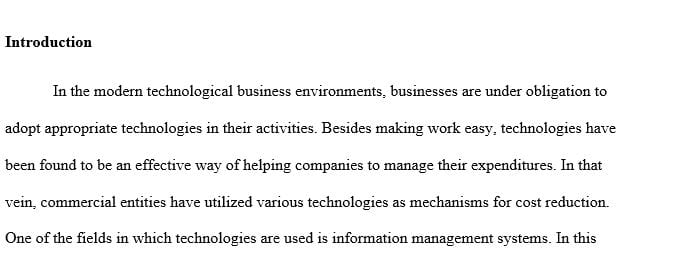Respond to a series of questions about a selected company’s information management system
In 800–1000 words, respond to a series of questions about a selected company’s information management system.
Meeting customer demands and high efficiencies are the goals of the majority of supply chains, and companies strive to develop sustainable long term supply chain solutions.
Show More
Toggle Drawer
Context
There is a need for coordination in the supply chain and to understand the impact of coordination on supply chain performance. The information management system measures the success of each supply chain partner and allows the members to improve as they develop trust and closer working relationships. The innovation and changes produced in supply chains, both in response to market changes or from the drive to improve efficiency, effectively customize its structure, and improve its performance.
Toggle Drawer
Questions to Consider
To deepen your understanding, you are encouraged to consider the questions below and discuss them with a fellow learner, a work associate, an interested friend, or a member of the business community.
For the following questions, refer to the National Geographic video, Ultimate Factories: IKEA, and Kinnander’s article, “IKEA’s Challenge to the Wooden Shipping Pallet,” listed in the Resources.
What is the importance of developing a sustainable supply chain?
What are three initiatives that IKEA is doing to make its supply chain sustainable?
Toggle Drawer
Resources
1. Suggested Resources
The following optional resources are provided to support you in completing the assessment or to provide a helpful context. For additional resources, refer to the Research Resources and Supplemental Resources in the left navigation menu of your courseroom.
Library Resources
The following e-books or articles from the Capella University Library are linked directly in this course:
Blanchard, D. (2010). Supply chain management best practices (2nd ed.). Hoboken, NJ: Wiley.
Bhatnagar, A. (2009). Textbook of supply chain management. Lucknow, India: Word-Press.
Drake, M. (2011). Global supply chain management. New York, NY: Business Expert Press.
Greeff, G., & Ghoshal, R. (2004). Practical e-manufacturing and supply chain management. Oxford, England: Newnes.
Farooqui, S. U. (2010). Encyclopedia of supply chain management: Volume I. Mumbai, India: Himalaya Books Pvt.
Farooqui, S. U. (2010). Encyclopedia of supply chain management: Volume II. Mumbai, India: Himalaya Books Pvt.
Farooqui, S. U. (2010). Encyclopedia of supply chain management: Volume III. Mumbai, India: Himalaya Books Pvt.
Show More
1. Assessment Instructions
In Assessment 3, you selected a company from the list below and wrote a paper about their supply chain strategy and their use of forecasting and planning to develop their strategy. In Assessment 4, you prepared a PowerPoint presentation for a company from this list. For this assessment, once again choose a company from this list, either one you analyzed in a previous assessment or one you have not used before.
L. Bean.
com.
Johnson and Johnson.
Research and write about your selected company’s information management system (IMS) and respond to the following questions. You can research your responses via the Capella library and the Internet.
Describe the company’s information management system.
Does its IMS give the company a competitive advantage over their competition?
How does the IMS help coordinate between supply chain partners?
Explain how the IMS helps to monitor orders and inventory levels and satisfy customers.
Explain why managing information is equally or more important to the company than moving products.
Write your answer in a Microsoft Word document in 800–1000 words. All written assessments should follow APA style and formatting guidelines for attributing sources.
Introduction
Describe an organization’s information management system (IMS).
Analyzes an organization’s information management system (IMS).
Evaluate the competitive aspects of an organization’s IMS.
Recommends improvements for the competitive aspects of an organization’s IMS.
Describe how the IMS helps coordinate between supply chain partners.
Analyzes how an IMS helps coordinate between supply chain partners.
Explain how an IMS helps monitor orders and inventory levels and satisfy customers.
Analyzes how an IMS helps monitor orders and inventory levels and satisfy customers.
Explain why managing information is equally or more important to a company than moving products.
Analyzes why managing information is equally or more important to a company than moving products.
Conclusion
References
Answer preview to respond to a series of questions about a selected company’s information management system

970 words


